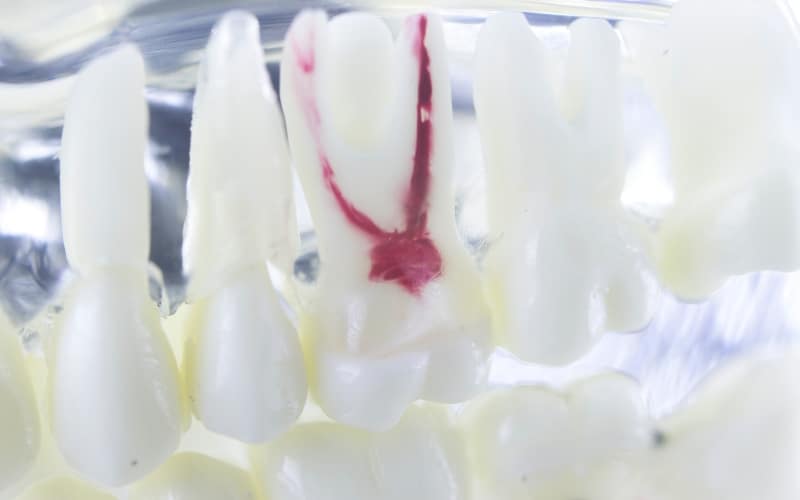Introduction
Root canal treatment, often called endodontic treatment, is a standard dental procedure to save a severely damaged or infected tooth.
It is a reliable solution for preserving your natural tooth, but like any medical intervention, its longevity depends on various factors.
In this brief guide, we’ll look at the components determining a root canal’s durability, typical reasons why treatments fail, and advice to ensure your root canal procedure holds up over time.
Factors Affecting a Root Canal’s Longevity
A. Quality of the Procedure
The success of your root canal treatment begins with the quality of the procedure itself. Choosing a skilled and experienced dentist to perform the treatment is essential.
A well-executed root canal ensures the infected pulp is thoroughly removed and the tooth is sealed correctly to prevent further infection.
Cutting corners during the procedure can lead to complications down the road.
B. Oral Hygiene and Dental Care
Good dental hygiene must always be practiced if you want your root canal to last.
Poor dental hygiene can result in new infections, affecting the treated tooth or neighboring teeth.
Make sure to brush and floss regularly, and consider using an antibacterial mouthwash recommended by your dentist. Keep in mind that dental care requires constant dedication.
C. Tooth Location and Function
The location and function of the tooth that underwent root canal treatment can impact its longevity.
The teeth towards the rear of your mouth experience more pressure and wear than the molars do, making them more prone to damage.
Discuss with your dentist whether additional measures, such as dental crowns, may be necessary to protect the treated tooth.
D. General Health and Lifestyle Factors
Your overall health and lifestyle choices can influence the durability of your root canal treatment. For instance, smoking might delay recovery and raise the chance of problems.
Additionally, illnesses like diabetes might impair the body’s defenses against infections.
To ensure the longevity of your root canal, maintain a healthy lifestyle and keep any medical conditions well-managed.
Common Reasons for a Failing Root Canal Treatment
Despite the best efforts, root canal treatments can fail. Some common reasons for treatment failure include:
1. Incomplete Removal of Infected Tissue:
If all infected tissue is not properly removed during the initial procedure, bacteria can persist and cause reinfection.
2. Poor Sealing:
Inadequate tooth sealing after the procedure can allow bacteria to re-enter the tooth and lead to reinfection.
3. Cracked or Damaged Tooth:
If the treated tooth experiences trauma, such as a crack or chip, it can compromise the success of the root canal.
4. New Infections:
Poor oral hygiene or other factors can lead to new infections in the treated tooth or the surrounding area.
5. Untreated Canals:
In some cases, complex tooth anatomy may result in untreated canals, leaving potential hiding spots for bacteria.
How long does a root canal typically last?
Depending on the individual, a root canal may last longer or shorter. Still, on average, a well-performed root canal treatment typically can last upto 10-15 years or even a lifetime with proper care and maintenance.
Following your dentist’s recommendations and attending regular check-ups is essential to monitor the treated tooth’s health.
Tips for Prolonging the Lifespan of a Root Canal
A. Proper Dental Hygiene
Maintaining a rigorous dental hygiene routine is paramount. Brush your teeth at least twice daily, floss daily, and use an antibacterial mouthwash as your dentist recommends.
Keeping your mouth clean helps prevent new infections and protects the treated tooth.
B. Regular Dental Checkups
Schedule regular dental checkups with your dentist to help monitor your treated tooth’s health, identify any potential issues early on, and address them promptly.
C. Diet and Lifestyle Adjustments
Adopting a tooth-friendly diet can help extend the life of your root canal. Reduce consumption of sugary and acidic foods and beverages, as they can erode tooth enamel. Additionally, avoid habits like teeth grinding, which can put extra stress on the treated tooth.
Wrap up!
The quality of the procedure, oral cleanliness, the tooth’s location, overall health, and lifestyle choices are just a few of the variables that affect how long your root canal treatment lasts.
By following the tips and choosing a reputable dentist like Advanced Solutions Family Dental for your root canal treatment, you can increase the chances of your treatment lasting for years.
Your smile is an important asset, and with the proper care, your root canal can continue to serve you well.
You can also read our other article: Transform Your Smile With The Power Of Cosmetic Dentistry.

